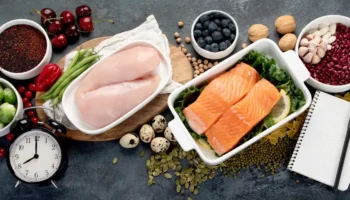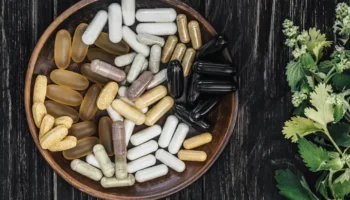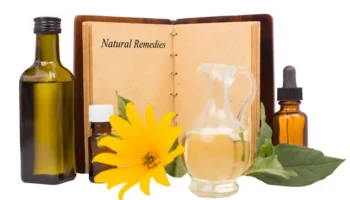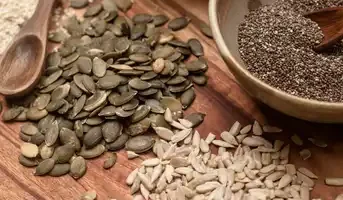As women enter their 40s, their bodies undergo several changes that can affect everything from bone health to energy levels. With these natural aging processes, proper nutrition and the right vitamins become essential in maintaining overall health and functionality. However, with a vast array of vitamins available, it can be overwhelming to determine which ones are truly important.
In this article, we’ll dive deep into the five most important vitamins that women over 40 should prioritize to maintain health and vitality. These vitamins play crucial roles in supporting energy levels, cognitive function, heart health, immune health, and even the condition of your skin. Keep reading to discover the must-have vitamins for women in their 40s and beyond!
1. Vitamin D3 – The Bone and Immune Booster
As we age, our ability to absorb Vitamin D3 becomes less efficient, making it particularly crucial for women over 40. Vitamin D3 plays a central role in calcium absorption, helping the body maintain strong bones. Insufficient levels of Vitamin D3 can lead to bone loss, putting women at higher risk for osteoporosis and fractures. Additionally, Vitamin D3 is essential for the immune system. It helps regulate immune responses and is linked to reducing the risk of chronic diseases and infections.
Research: A study published in the Journal of Clinical Endocrinology & Metabolism found that sufficient Vitamin D levels are associated with better bone mineral density in postmenopausal women, highlighting its importance for osteoporosis prevention. Moreover, a meta-analysis published in Frontiers in Public Health in 2020 found that Vitamin D deficiency increases susceptibility to respiratory infections, including COVID-19, reinforcing the vitamin’s critical role in immunity.

Natural Sources:
- Fatty fish (salmon, mackerel, sardines)
- Egg yolks
- Fortified dairy products
- Fortified plant milks (such as soy and almond milk)
Supplement Cost:
- In the US: $15–$40 per bottle (1–2 month supply)
- In the UK: £12–£35
2. Vitamin K2 – The Bone and Heart Health Protector
While Vitamin D3 helps the body absorb calcium, Vitamin K2 plays an essential role in ensuring that calcium is directed to the bones, where it is needed, and not deposited in the arteries, where it can cause harmful calcification. This unique ability makes Vitamin K2 crucial for women over 40, as hormonal changes associated with aging make them more vulnerable to osteoporosis and cardiovascular disease.
Research: According to a study published in the Journal of the American College of Cardiology, adequate levels of Vitamin K2 were linked to reduced risks of arterial stiffness and improved cardiovascular health. In addition, a study in Osteoporosis International concluded that Vitamin K2 supplementation helped improve bone mineral density and reduce the risk of fractures in postmenopausal women, underlining its importance for bone health as women age.

Natural Sources:
- Fermented foods like natto (fermented soybeans), sauerkraut, and kimchi
- Grass-fed dairy products
- Organ meats (liver)
Supplement Cost:
- In the US: $15–$40 per bottle (1–2 month supply)
- In the UK: £12–£35
3. Vitamin B12 – Energy and Cognitive Function Support
As women age, the body’s ability to absorb Vitamin B12 diminishes, leading to potential deficiencies. Vitamin B12 is essential for producing red blood cells, supporting brain health, and maintaining healthy energy levels. A deficiency in Vitamin B12 can lead to fatigue, memory issues, and even neurological problems.
Research: A 2013 study published in Neurology linked low Vitamin B12 levels to brain shrinkage and cognitive decline in older adults. Additionally, research in The Journal of Clinical Investigation has demonstrated that Vitamin B12 supports the nervous system and is essential for reducing the risk of neurological disorders like dementia. It is also crucial for maintaining mood stability, as its deficiency has been associated with depression and cognitive impairment.

Natural Sources:
- Animal products like meat, poultry, fish, eggs, and dairy are excellent sources of Vitamin B12.
- For those on plant-based diets, fortified plant milks, cereals, and nutritional yeast are great alternatives.
Supplement Cost:
- In the US: $10–$30 per bottle
- In the UK: £8–£25
4. Vitamin C – Immune Boosting and Collagen Production
Women over 40 often notice a natural decline in immune function, making Vitamin C even more important. Vitamin C is well-known for its immune-boosting properties, but it also plays a vital role in collagen production. Collagen is a protein that helps maintain skin elasticity, hydration, and firmness, which becomes increasingly important as women age and begin to experience skin aging.
Research: A 2020 study published in Nutrients found that Vitamin C supplementation significantly improved skin elasticity and hydration in women aged 40 and above, helping to reduce wrinkles and promote smoother skin. Additionally, Vitamin C’s antioxidant properties protect cells from oxidative stress, which is linked to aging. The vitamin also supports immune function by protecting against infections, as shown in research published in The American Journal of Clinical Nutrition.
Natural Sources:
- Citrus fruits (oranges, lemons, grapefruits)
- Strawberries, kiwi, and papaya
- Bell peppers, broccoli, Brussels sprouts, and kale
Supplement Cost:
- In the US: $8–$25 per bottle
- In the UK: £6–£20
5. Folate (Vitamin B9) – Heart & Cellular Health Support
Folate, or Vitamin B9, is crucial for cell function and tissue growth. It is also vital for DNA synthesis and the production of red blood cells. As women age, folate becomes especially important for supporting heart health. It helps lower homocysteine levels, a compound that, when elevated, can increase the risk of cardiovascular diseases.
Research: A 2002 study published in The American Journal of Clinical Nutrition showed that adequate folate intake was associated with a reduced risk of stroke and cognitive decline. Folate supplementation has been shown to lower homocysteine levels, which is crucial for reducing cardiovascular risks. Additionally, a study in The European Journal of Clinical Nutrition found that folate intake is linked to a reduced risk of heart disease, further emphasizing its importance for cardiovascular health in women over 40.
Natural Sources:
- Leafy greens (spinach, kale, and arugula)
- Beans, lentils, chickpeas, and fortified cereals
- Citrus fruits and avocados
Supplement Cost:
- In the US: $10–$30 per bottle
- In the UK: £8–£25
Conclusion
As women enter their 40s, proper nutrition and vitamin intake become increasingly vital for maintaining overall health. By prioritizing these five essential vitamins—Vitamin D3, Vitamin K2, Vitamin B12, Vitamin C, and Folate (Vitamin B9)—women can help maintain energy, enhance cognitive function, support bone and heart health, and boost immunity.
Although these vitamins can be found in food, supplementation may be necessary to ensure adequate intake, especially if dietary sources are lacking. It’s always wise to consult with a healthcare provider before starting any new supplement regimen to determine the right dosage and combination for your unique needs.
With the right vitamins, women can continue to feel confident, healthy, and energized as they navigate life after 40, helping to maintain a high quality of life and well-being for years to come.







